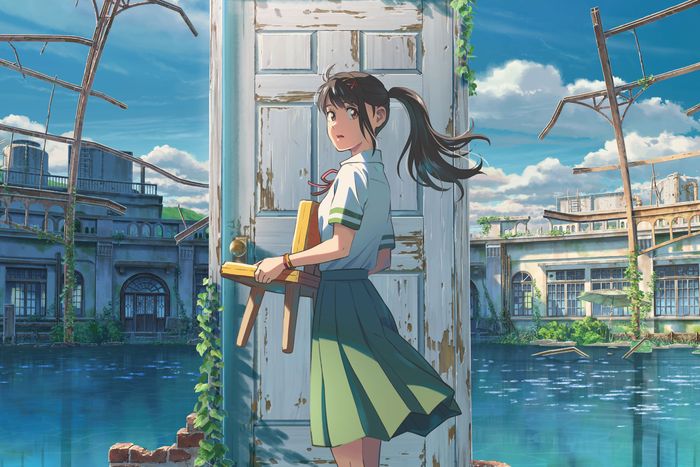
To make animated movies in Japan is to dwell in the shadow of Hayao Miyazaki, and Makoto Shinkai has been ducking comparisons to the legendary artist since his 2016 hit Your Name surpassed Spirited Away at the global box office. In his new film, Suzume, Shinkai surrenders to the inevitable by putting his teenage heroine in pursuit of a magical talking cat named Daijin. Daijin is wide-eyed, adorable, and decidedly Ghibli-esque — like a sinister sibling of Jiji from Kiki’s Delivery Service, given that wherever he goes, disaster seems to follow. If Daijin is a nod to the king of Japanese animation, he’s also a reminder of just how different Shinkai’s work is in how it blends magical adventure with contemporary details. Suzume takes place in a universe where people have watched Miyazaki’s films and post, “OMG, I feel like I’m in Whisper of the Heart!” as the caption on a picture of Daijin on the train, leaving a trail of social-media posts for Suzume (Nanoka Hara) and her companion Souta (Hokuto Matsumura) to follow across the country. That grounding in the present is one reason Shinkai is such an unbeatable purveyor of untrammeled youthful emotion. Suzume isn’t timeless — it’s very much about its moment, about coming of age in a contracting Japan whose future is unclear.
It’s also about saving the day and falling in love under the skies that are Shinkai’s signature: striated with feathery clouds, strewn with stars, offering a vast gradient of blues and purples. If Shinkai’s protagonists start off in worlds marked by mundane textures — like the details of the bright, cluttered house that 17-year-old Suzume lives in with her aunt, Tamaki (Eri Fukatsu), in a seaside town in Kyushu — those skies represent the promise of grandeur. That grandeur arrives in Suzume’s life thanks to a brush with a passing stranger as she’s headed to school one morning. A young man who’ll eventually introduce himself as Souta asks if there are any ruins nearby, telling her, “I’m looking for a door”; on Suzume’s advice, he heads toward an abandoned village near the mountains. Unable to stop thinking about the strange encounter (and the guy’s beauty), she follows him to the wreck of the old spa town, and finds, as promised, a door in the middle of nowhere that opens onto a twilight landscape she can see but cannot get to, as well as a statuette that transforms into Daijin and hops away. That other world turns out to be home to a giant worm that keeps trying to make its way into ours, where it threatens to crash into the ground and cause earthquakes. And Suzume has unknowingly weakened the barriers keeping it away.
That worm is a take on the giant catfish that, in myths, lives under Japan and causes seismic disruptions whenever the god tasked with holding it down with a stone slips in his duties. It also brings to mind Haruki Murakami’s “Super-Frog Saves Tokyo,” in which a downtrodden salaryman is visited by a giant frog who asks for his help battling a worm under the city in order to stop it from, yes, causing an earthquake. Like the protagonist of that short story, Souta turns out to have an unremarkable life outside his duty to seek out and close magical doors that, when open, give the worm a chance to wreak havoc. While Souta’s considerably hunkier than the salaryman, he also spends much of the film transformed into a child’s wooden chair, an amusing indignity for a swoony love interest. As Suzume and Souta (in chair form) chase Daijin across the country, they try and sometimes fail to stop the natural disasters erupting along the way, but their acts of bravery and sacrifice are invisible to everyone around them.
Catastrophe runs through the film like silvery scar tissue — Suzume’s mother died in the 2011 earthquake — but behind that is the more gradual crisis of the shrinking population responsible for so many of the abandoned areas where the worm is able to escape. Countering this decline, in the film’s loveliest idea, is the community and connection Suzume gets from the strangers who help her along the way, and from the exasperated but loving aunt who raised her. Like Shinkai’s previous film, Weathering With You, Suzume is about young people who’ve inherited responsibility for a crumbling world they have to risk everything to save. It’s also a tribute to the mundane — to Souta’s cluttered but cozy student apartment, to the ramshackle red convertible his friend Tomoya (Ryunosuke Kamiki) drives, to the red-faced customers at the Kobe bar Suzume ends up spending a night in, to the people jogging alongside the river or making their way home from work at the end of the day. Suzume may be a less effective romance than something like Your Name — it’s tough when half of your main pairing is a piece of furniture — but that’s because its real love story is with the stuff of everyday life, making it almost unbearably inviting and worth fighting for.
More Movie Reviews
- Fernanda Torres Is a Subtle Marvel in I’m Still Here
- Grand Theft Hamlet Is a Delightful Putting-on-a-Show Documentary
- Presence Is the Best Thing Steven Soderbergh’s Done in Ages


